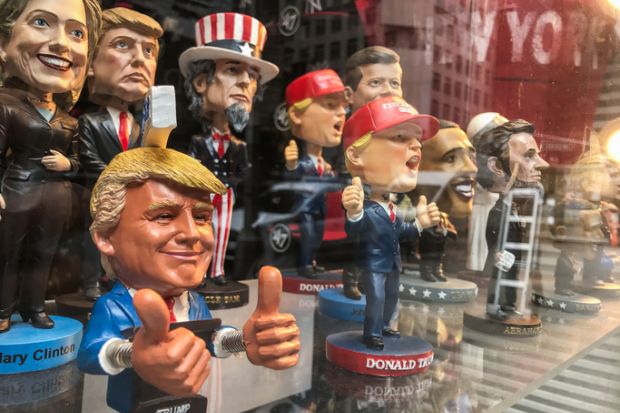US President Donald Trump made his first-ever visit to an historically black college, delivering a campaign-style address to his supporters at Benedict College in South Carolina after it largely agreed to bar its own students.
Mr Trump’s surprise visit to Benedict and its terms, kicking off a weekend of speeches by Democratic challengers, demonstrated anew the willingness of black college leaders to tolerate or even embrace a president widely opposed in their own communities.
Benedict accepted the visit, including broad restrictions on event attendees and on nearby student movement, just days after Mr Trump faced criticism for suggesting the impeachment process underway in the House of Representatives was similar to a “lynching”.
Various politicians and black leaders condemned Mr Trump’s comparison of a constitutionally sanctioned process for presidential removal to the thousands of extrajudicial killings of black Americans after the Civil War. But Politico, surveying at least a dozen historically black colleges, said few seemed willing to publicly confront Mr Trump over the matter.
The US has 101 historically black colleges and universities, and nearly all are struggling financially and heavily dependent on federal government support.
Speaking at Benedict, Mr Trump took credit for Congress increasing federal funding for historically black colleges by 13 percent over the past years, without noting that his own budget recommendations had proposed flat or reduced funding levels for such institutions.
“My administration will always treasure and protect HBCUs, like Benedict College,” Mr Trump told a cheering audience of about 300 people at Benedict, which was founded almost 150 years ago by a Baptist minister.
The college largely allowed Mr Trump’s organisers to select his attendees and Benedict said fewer than a dozen of its students were allowed inside. Benedict also cancelled classes for the day and requested that students remaining on campus largely stay inside their dorms during the event.
A few dozen protesters, comprised of both supporters and opponents of Mr Trump, engaged in shouting matches outside the auditorium. Inside, Mr Trump declined to take any questions following his hour-long speech.
The event was created by the 20/20 Bipartisan Justice Center, a non-profit organisation created in 2015 by 20 black Republicans and 20 black Democrats, as a weekend-long forum where Democratic presidential candidates planned to discuss criminal justice reform.
Mr Trump made a late decision to attend and receive an award for his role in congressional passage of a bill known as the First Step Act that contained various provisions to help inmates leave jail early and transition back to society.
Mr Trump and leaders of black colleges also have found some common ground with White House efforts to fight an Obama administration regulation that lets students seek the dismissal of their federal loans if they were defrauded by their institution.
The nation’s historically black colleges played a critical role in black education after the last century and a half. But many are now looking anxiously at their prospects for such federal support to save them from ongoing declines in funding and enrolment.
Register to continue
Why register?
- Registration is free and only takes a moment
- Once registered, you can read 3 articles a month
- Sign up for our newsletter
Subscribe
Or subscribe for unlimited access to:
- Unlimited access to news, views, insights & reviews
- Digital editions
- Digital access to THE’s university and college rankings analysis
Already registered or a current subscriber? Login







